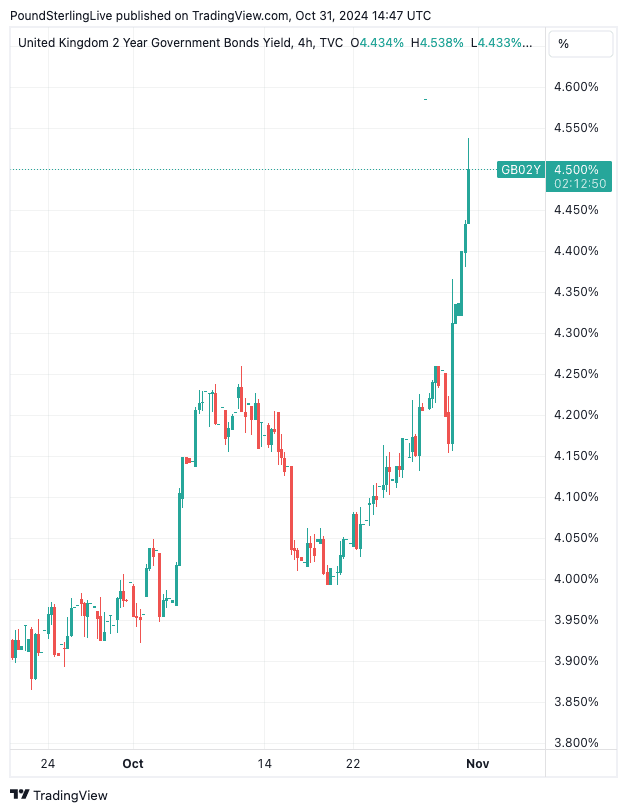
Image © Adobe Images
Like vultures, the bond vigilantes are circling UK government bonds, and one analyst says Rachel Reeves might have to reverse some measures.
UK stocks are down sharply on Thursday, and the pound is also under pressure. GBP/USD has reversed earlier gains, and is below $1.2920 at the time of writing, suggesting that it is also cowering from the bond vigilantes.
The Budget has not been well received by the bond market. The whole UK yield curve has moved higher, with 2-year yields rising nearly 20bps, and 10-year yields up 15 bps, at the time of writing.
This is another sign that the Chancellor overestimated the market’s desire to absorb more sovereign debt issuance from the UK.
While it is true that bond yields are rising around Europe and the US, the UK is the clear underperformer today.
The 10-year Gilt yield is now at the highest level of the year so far, as the bond market gives its verdict on the first Labour budget. 10-year yields are now only 25 bps away from their high reached on 17th August 2023, the peak of the last 5 years. The Budget has caused a bond market reaction, and the bond vigilantes are back baying at the UK’s door.
There is a sense of panic around this budget, which is akin to the Liz Truss budget. Jeremy Hunt stabilised the ship back in 2022, now it is swaying around, without the anchor of fiscal prudence.
Above: UK two-year bond yields.
How high will UK yields go? Now they have breached the 4.5% level, what is to stop them surging further?
Will the BOE need to step in, like they did in 2022? The risk is to the pensions market and the mortgage market, which could materially impact UK economic growth.
Today’s move in bond yields will add millions to the UK’s debt bill, it will also push up mortgage rates for thousands of homeowners. The budget has also triggered a rapid recalibration of rate cut expectations in the UK. The implied interest rate for September 2025 is now 4.14%, on Tuesday this was 3.81%.
This bond market sell off could not come at a worse time for the government. The rapid and material increase in the implied interest rate will be fed into the BOE’s model and will likely act as a drag on their growth forecasts that will be released at their meeting in a week’s time. The OBR’s upgraded inflation outlook will also likely weigh on the BOE’s CPI outlook.
The question now is, will the government perform some sort of U-turn? They will not want to do so politically, but they may be forced too financially. If we continue to see UK yields rise at this pace, then Reeves may find she does not last long in her job.
Why the UK bond market is under attack
Unfunded borrowing to invest is seemingly treated the same way as unfunded tax cuts.
Higher public spending is not what investors want to see. They do not want the public sector to crowd out the private sector, and they also don’t like tax burdens that are so high they threaten future growth rates. It’s different for the UK compared to our peers.
In France etc., where public spending levels are high, they have Germany as their north star of fiscal prudence. The US has the world’s reserve currency, so they are also given more leeway. The UK does not have this. This is not the outcome that the government wanted from this Budget, and it has trashed their credentials of stable fiscal management.
Looking ahead, there will need to be some damage control, and we would not be surprised if some measures are rolled back on.
The new government now know the limit of the bond market to its spending plans.

